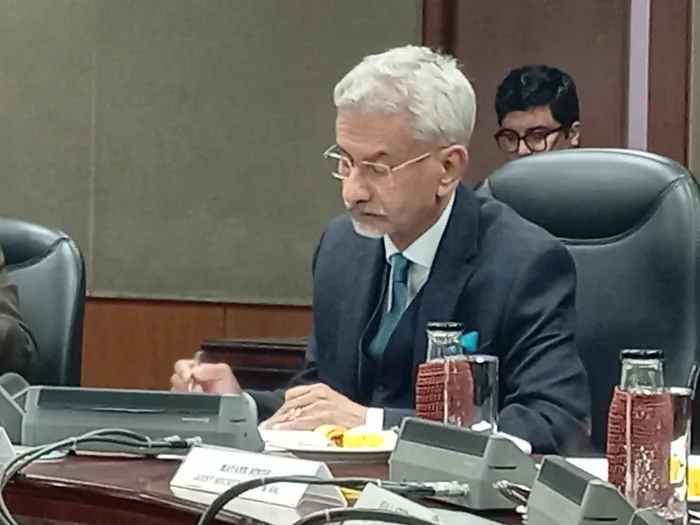India’s African commitment

SUBRAHMANYAM Jaishankar, India’s Minister of External Affairs, during his engagment with African journalists in New Delhi, India. Picture: MERVYN NAIDOO
IT MIGHT be the case that many countries across the world give priority to keeping their own home fires burning and plough little or no attention to foreign policies, but that stance is not adopted by India.
As a global south country, India is “willing to commit resources abroad”, grow its international presence, and cement its already established relations with countries like South Africa and increase its list of friends in Africa.
Subrahmanyam Jaishankar, India’s Minister of External Affairs, spoke about his nation’s foreign affairs position with a group of journalists from southern and east Africa in New Delhi, last week.

“India’s relationship with the world is growing. Foreign policy is a popular domain where we invest more resources each year.”
“Every year we see more Indians travelling abroad, and we are in favour of increased trade, technology, and investment flowing out of the country.”
Jaishankar said local companies were encouraged to invest in Africa and make investments that were in relation to the demands of the respective nations.
“We want manufacturing to be everywhere, that is what economic security is about.”
While globalisation was real, Jaishankar said a re-globalisation was needed to ensure investment, manufacturing and technologies also went to Africa.
“Africa should not be perceived as a resource provider, it is also a consumer that has pools of talent and can be a bigger manufacturer.”
Jaishankar said that was the message embedded in their development programmes and given to businesses venturing out.
He said the state of the world was not good presently with two major wars on the go, and the Covid-19 pandemic was still having a stifling effect on some countries.
“There are still problems with development, resources, debt and connectivity. Another big concern is the number of countries turning inwards, into their own society. Foreign policy is not popular and there is hesitation to commit resources abroad.”
Jaishankar said his countrymen were generally interested in the happenings around the world.
“People understand their lives are affected by the world and that they can also be influential abroad.
“For historical reasons, there is always a different feeling about the global south. Many of us have emerged from a few hundred years of misfortune and travails that affected our societies.
“Therefore, we all have an inherent solidarity, so it is important that that solidarity remains in our policy making.”
He said that India’s economy, per capita income and all-round capabilities were constantly expanding and remained true to its foundational values.
“There are some broad approaches we follow in our partnerships with African countries.
“We always ask the countries in question what their priorities were. That’s our priority-driven relationship with partnering nations. At times we are not good at it and we remain candid about it.
“And in many areas, we want to have a variety of options, that’s how we grew and got better deals from the world.”
He said that he grew up in a generation that saw the liberation of South Africa and other African states.
“Many people thought it wouldn’t happen in their lifetimes. In India it took years of sustained struggle to achieve.
“It means that you have to keep working at difficult objectives. That is why it is called the Struggle. Then suddenly, cracks develop and changes come about.
Jaishankar believed the “needle is moving in the direction of reform” especially for global south nations, regarding key issues in world politics.
“We need solidarity to change the global order, not nice words and promises.”
About India’s own difficulties with issues like homelessness, unemployment and infrastructure challenges, he said much effort had gone into addressing similar issues over the past decade.
“When Prime Minister (Narendra) Modi took office, he recognised homelessness was a big problem and started a scheme to provide for low and no income earners.”
Jaishankar said it was “crucial” to first produce an appropriate digital public infrastructure for the effective identification of its citizens, to ensure that the rightful people were handed houses.
“Over 200 million people received roofs over their heads over a decade. Our goal for the next five years is to hand out another 30 million homes.”
He said another way to fix the housing problem was to create economic activity.
“When there is growth, there is more income, some form of employment and that is a way to challenge the jobs and homeless problem.”
India, the most populous nation in the world, achieved a 7.6% GDP rate in the last financial term.
Jaishankar said it's a growth trajectory that they aimed to maintain in a multi-pronged way by developing various sectors of governance and weed out wasteful expenditure.
He said their achievements had improved their national psyche and gave hope to other nations.

Professor Anil Sooklal, SA’s High Commissioner in India said the two countries’ strong bonds and cooperation was underpinned by their common shared history of struggle and freedom, which has cascaded into their ongoing strategic partnership.
“South Africa shaped Gandhi’s political and spiritual philosophy which catapulted him into the forefront of India’s freedom struggle. Likewise, India assumed a leadership role in the internationalisation of South Africa's liberation struggle by being the first country to impose sanctions against the apartheid regime in 1946. President Mandela previously acknowledged the important role India played in SA's liberation.
“Today India ranks as SA' fifth largest trading partner and India’s largest trading partner in Africa.
“Over 130 Indian companies are present in SA providing several thousand jobs. ”Presently, the I.7 million strong local Indian community is a vibrant and integral part of South Africa's multi cultural tapestry that also serves as an important bridge linking our two important countries of the Global South,“ he said.
SUNDAY TRIBUNE